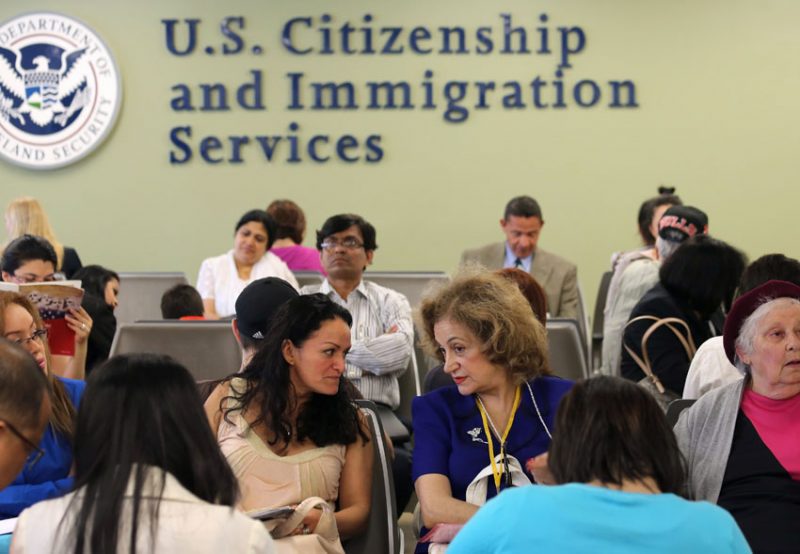USCIS Strengthens Guidance for Spousal Petitions Involving Minors
File photo of Immigrants awaiting their turn for green card and citizenship interviews at the U.S. Citizenship and Immigration Services (USCIS) Queens office on May 30, 2013 in the Long Island City neighborhood of New York. The branch office is located in an area heavily populated by immigrants and processes thousands of Green Card and U.S. citizenship applications each year. (John Moore/Getty Images)
U.S. Citizenship and Immigration Services (USCIS) recently announced additional guidance regarding the adjudication of spousal petitions involving minors, following up on the agency’s February update to its policy.
The guidance, published as an update to the USCIS Adjudicator’s Field Manual (AFM), instructs officers to conduct an additional interview for certain I-130 spousal petitions involving a minor. Generally, the bona fides of the spousal relationship are assessed in person by USCIS when the alien spouse applies to adjust status, or by the Department of State when the alien spouse applies for an immigrant visa. However, I-130 spousal petitions involving a minor party warrant special consideration due to the vulnerabilities associated with marriage involving a minor. As such, USCIS is modifying its policy to require in-person interviews at this earlier stage for certain I-130 petitions involving minor spouses.
“As part of our continued efforts to strengthen guidance for spousal petitions involving minors, we have instructed USCIS officers to conduct an additional in-person interview earlier in the immigration process for certain petitions that warrant additional scrutiny,” said USCIS Director L. Francis Cissna. “While USCIS has taken action to the maximum extent possible to detect and closely examine spousal petitions involving a minor spouse, Congress should address this issue by providing more clarity under the law for USCIS officers.”
Interviewing earlier at the I-130 petition stage provides USCIS with an additional opportunity to verify information contained in the petition and assess the bona fides of the claimed spousal relationship. USCIS officers will now conduct interviews for the following I-130 spousal petitions as part of the adjudication of any I-130 spousal petition where:
- The petitioner or the beneficiary is less than 16 years old; or
- The petitioner or the beneficiary is 16 or 17 years old and there are 10 years or more difference between the ages of the spouses.
While there are no statutory age requirements to petition for a spouse or be sponsored as a spousal beneficiary, USCIS published guidance earlier this year detailing factors that officers should consider when evaluating I-130 spousal petitions involving a minor. USCIS considers whether the age of the beneficiary or petitioner at the time the marriage was celebrated violates the law of the place of celebration. Officers also consider whether the marriage is recognized as valid in the U.S. state where the couple currently resides or will presumably reside and does not violate the state’s public policy. In some U.S. states and in some foreign countries, marriage involving a minor might be permitted under certain circumstances, including where there is parental consent, a judicial order, emancipation of the minor, or pregnancy of the minor.
In addition, per regulation, USCIS may use its discretion to issue a request for evidence (RFE) where appropriate. As with any benefit, the burden is generally on the petitioner to demonstrate the validity of their petition and the bona fides of their spousal relationship.
These AFM updates are part of USCIS’ continuing efforts to ensure that our policies and processes remain current and are compliant with existing immigration law. USCIS also created a flagging system that sends an alert in an electronic system at the time of filing if a minor spouse or fiancé is detected. After the initial flag, the petition is sent to a special unit that verifies that the age and relationship listed are correct before the petition is accepted. If the age or classification on the petition is incorrect, the petition will be returned to the petitioner for correction.
For more information on USCIS and our programs, please visit uscis.gov or follow us on Twitter (@uscis), Instagram (/uscis), YouTube (/uscis), Facebook (/uscis), and Linkedin (/uscis).


